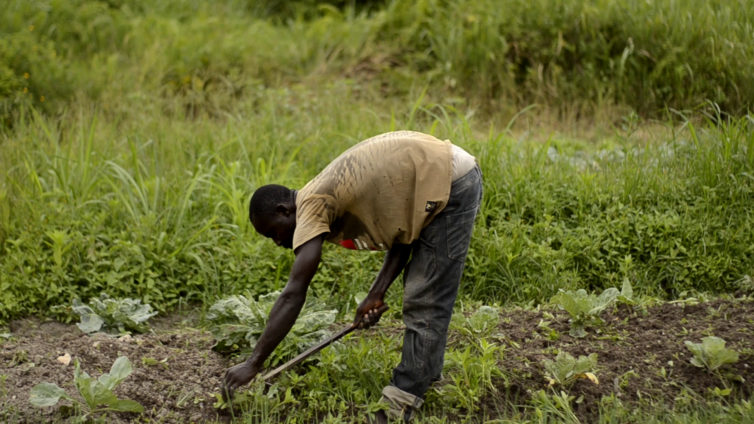The rising cost of agriculture inputs, including fertilizer, is taking a huge toll on crop production and food prices.
In Ghana, high cost of fertilizer can lead to less production.
To mitigate the impact of the high cost of fertilizer on food security and to strengthen food system resilience in Ghana, SOS-GrEEn is promoting the production of organic fertilizer in some regions.

Frank Otu Acheampong spends over 2,000 Ghana cedis buying 6 boxes of fertilizer for his ten acre farm.
The high cost of farm production has affected his farm business financially.
"After SOS-GrEEn trained us on how to produce organic fertiliser with waste, I don't buy organic fertilizers anymore and this has help me to be financially stable," he said.
Currently, all inorganic fertilizers are imported with Nitrogen Phosphorus and Potassium (NPK) taking about 50% of the imports while urea, ammonia and the rest cumulatively take the remaining 50%.
In 2020, Ghana imported about 620,000 metric tonnes of fertilizer to feed the agricultural sector, especially for the planting for food and jobs programme, which had a significant impact on production.
SOS-GrEEn has trained farmers in the Ashanti and Western regions to make organic fertilizer to mitigate the challenges faced by farmers.

According to farmers, including Frank, "opting for organic fertilizer for his farm has improved yields and reduced cost"
Agnes a farmer said, "The training has really helped improve my rice farming. I use to spend the little I have on inorganic fertiliser but after learning how to produce fertilizer locally, I spend less on my own 3 acre of rice."
The SOS-GrEEn Project under the EU and UN Capital Development Fund (UNCDF) is effectively managing community waste and utilizing organic manure as fertilizer to reduce the presence of POPs (Persistent Organic Pollutants) in the environment while securing higher crop yields.

"The project has the goal of reducing the use of inorganic manure on farms and boost harvest. As part of our green agenda the skills we've equip the beneficiaries with to produce organic fertilizers will conserve the earth,"SOS-GrEEn Project Coordinator, Shaibu Fuseini revealed.
Latest Stories
-
Medikal set to headline WatsUp On Campus this Saturday at Cape Coast Technical University
6 minutes -
It appears Dr. Duffuor was being used as a scapegoat – Kofi Abotsi
29 minutes -
FA set to deliver Paqueta verdict
29 minutes -
Messi ‘upset’ over ban for skipping MLS All-Star game
34 minutes -
Isak situation has to be right for Newcastle – Howe
42 minutes -
JoyNews’ Erastus Asare Donkor honoured with 2025 Environmental Heroes Award
46 minutes -
Trump says US may not reach trade deal with Canada
46 minutes -
Livestream: Newsfile discusses AG’s dropping of uniBank charges, Auditor-General’s report, budget review
1 hour -
Ghana signs €87.7m debt relief agreement with France
4 hours -
WatsUp On Campus storms UniMAC-GIJ tonight with OlivetheBoy and AratheJay
4 hours -
Kumasi killings: Police snap checks intensify
4 hours -
Almost a third of people in Gaza not eating for days, UN food programme warns
4 hours -
Afenyo-Markin offers apology to Dr. Ayensu-Danquah over “strange reasons” remark
5 hours -
How Dr. Ayensu-Danquah cleverly evaded Afenyo-Markin at her vetting
5 hours -
Dr. Ayensu-Danquah defends professorship, stating 15 years of teaching surgery
7 hours

